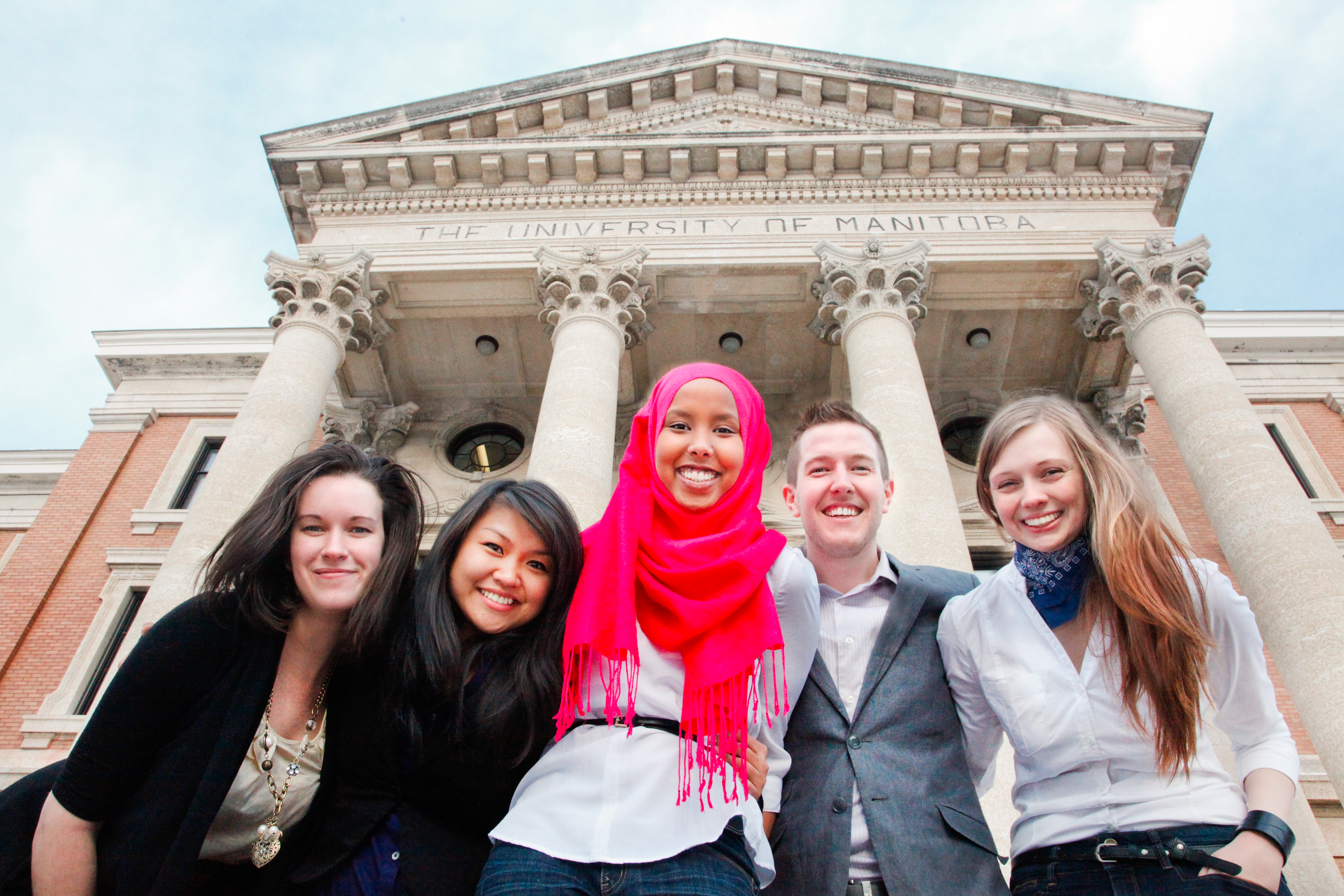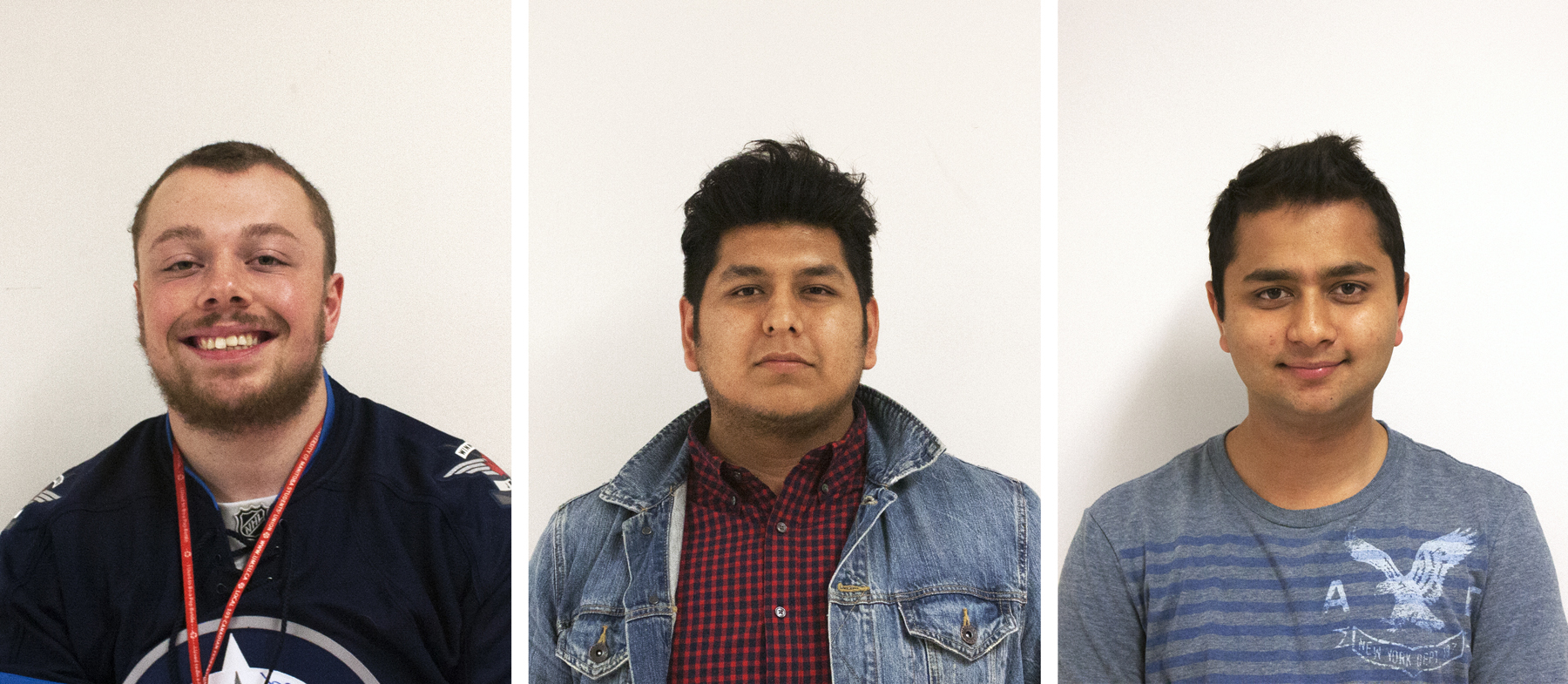1. If you are elected, how will you approach the next stages of the U-Pass adoption?
Ronnie Cruz, VP student services: We’re going to continue to work on the negotiations, trying to find the best opt-out options for those who drive. Basically, we want to try to find more funding to lower it to more than $170 per student. And, hopefully, we can implement it sooner than September, 2014.
Bilan Arte, president: One thing we’re also really passionate about is improving transit services in general. I think it would be cool to have forums and more interactive discussions with students and Winnipeg Transit on campus on how we can improve transit services to all of our campuses.
2. What appears to you to be the biggest concerns of students? How will you address them if elected?
Rachel Fields, VP external: We keep hearing about food and parking at both campuses. On the issue of parking on the Fort Garry campus, we’re going to have to address the fact that, during Bomber games, students aren’t allowed to drive onto campus [ . . . ] We want to continue to fight for our right to access this campus.
On the food issue, the Aramark contract is coming up in 2014 and the [Your Voice] executive [ . . . ] will have the opportunity to begin talks to get new food services or improve the existing food services. We’re aiming for more options, such as more vegan, halal, kosher, and gluten-free, as well as less expensive food, better quality, and longer service hours.
3. Please outline the core values of your slate – or, what underlying principles will guide your decision-making if elected?
Arte: I think we emphasize that when we talk about “Your Voice,” we’re talking about student issues and things that students care about. We understand that our student body has a diverse number of interests and needs. We’ve tried to reflect that in our platform.
Neil Loewen, VP internal: Moving forward, what Bilan is talking about is going to be manifested through, for example, the Hub advisory committee or the business advisory committee, where students sit on these committees that directly impact how these businesses are run. I think the overriding characteristic of our slate is that we want student voices to be heard and it needs to be completely transparent so that students are consulted in every step of the process.
4. Do you expect that your slate will draw voters disproportionately from one locus along the political spectrum? Please explain why or why not.
Jennifer Black, VP advocacy: I think a lot of our ideas are really progressive and I think that we can appeal to anyone on campus. Our platform is about 50 points long and is really diverse. If you aren’t too interested in equity campaigns, you might be more interested in, say, Ronnie’s events ideas or Neil’s services plans. And, of course, we want students to help us build our ideas.
5. How do you think the university administration could better meet the needs of students? On the other hand, what has the administration done well in the past year? To what extent do you think that your slate can influence administration policy?
Cruz: The not-so-well part is the lack of 24-hour library access. If other U15 universities have that option, why can’t we have it here – especially during midterms and finals? It would be an awesome thing for administration to allow us to do that in this coming year.
Black: We’ve been disappointed this year in the way the university has limited student engagement in their decision-making. With the Southwood Lands golf course, we didn’t get a seat on that jury, even though students pushed really hard for one. I also think, though, that they are taking some steps in the right direction. The university recently hired a health and wellness coordinator, which I think is a really good step for this campus in evaluating in what ways we can change our campus community to better serve the mental heath of students.
6. Can you share your thoughts on how you predict the health sciences cluster initiative will impact students? What is UMSU’s role to play in this process?
Black: I think the role of the students’ union is to make sure that the concerns of students are being heard. What we have to make sure we do is engage with students who are in those faculties who have concerns, and we have to make sure that those are heard by the administration. We’ve been meeting with the student leaders for their various councils, and bringing them to Joanne Kesselman, and making sure that there is direct communication. We’re also attending as many of the consultations and town halls as we can to voice different things we’ve heard from students and make sure that they’re at the forefront of these discussions.
As far as how students will be affected, I think every part of the clustering initiative will impact students in different ways. They want to move certain faculties down to the Bannatyne campus, and that will have certain effects, as downtown space is already very cramped. There are questions on whether they’re going to be putting up new buildings, how much new parking they are going to be building, and how we can all work with transit to improve services to those areas. There are many things to consider. A lot of things are still up in the air. But as long as the university uses the clustering initiative for what they’ve stated it to be, I think it can be very beneficial for students.
7. If you are elected, what will be your proudest achievement once your term is up?
Loewen: To see the Hub transformed into a little bit more of what Wise Guys used to be to campus: somewhere that student groups can go, that is very accessible to them, and that is not charging a lot of money. We want it to be somewhere that students can go any night of the week for parties or for a meal after school. It will be a huge asset to the university to have the Hub functioning in that way.
Black: Speaking for Bilan and myself, I think the U-Pass will be our legacy. We worked really hard to get that referendum off the ground, and if we’re given the chance to sit for a second term, we’re going to secure the greatest U-Pass deal for students, and we’re finally going to get into the 21st century.
Arte: In terms of equity and accessibility, I feel like we might also be able to leave a lasting impact on our campus by having gender-inclusive washrooms in at least every single building.
8. What changes need to be made to the delivery of food services at the U of M?
Black: I think the biggest thing that needs to change is the management of the food services. Breaking down the near-monopoly that Aramark has is our number one priority for dealing with food services. There will be no incentive for them to provide better services until there is the opportunity for other service providers to set up on campus.
Arte: Also, hours of operation is a big issue. This is especially a big issue if you live in residence. If you are in town over reading week and there is nothing that’s open, it is kind of ridiculous.
9. Why is the campus going to be more fun next year?
Loewen: Again, it goes back to the Hub, and also just bringing in different events. Having the stadium here is going to be a huge opportunity for UMSU to work with, say, True North or another company, to throw bigger, better events. Rather than the stadium just being something that takes up our parking several days of the year, we should try to use it to our advantage.
Black: We have a lot of good ideas for events we can have on campus. We want to hold a winter and fall games, kind of like an UMSU Olympics. We also think building the skating rink on the quad is a bit of a mess when we could just scrape off the river. That is something we want to implement next year.
10. What can your slate do to improve and expand study spaces at the U of M?
Arte: We realize that we are a commuter campus and, a lot of the time, that is because space is really rare. Ultimately, expanding those spaces is something student unions should be advocating for. I don’t think they should be funding it because, at the end of the day, it is university space and we pay a lot of money into the university for capital infrastructure costs, so I think that it is something that needs to be prioritized better in the university’s budget.
Black: The university is undergoing a space audit currently, so I think now is a really good time to step in and make sure they’re not just planning where they’re going to put their offices but recognize that students need a space on campus, too.
11. What student-relevant issues have been neglected and now need to be addressed?
Loewen: Privatization on campus. Different university services being turned over to private corporations turns over a lot of the student experience to a non-university entity, which is taking a lot of control out of our hands and puts the focus on profits rather than student experience.
Arte: Our issue is with student fees. This summer there was a bill that was passed through our legislative assembly that will tie student fees to inflation. Tuition fees went up 2.8 per cent this year alone. If you’re barely scraping by or have loans, it becomes a really huge problem.
12. What will you do to ensure that you are always coming as close as possible to representing students as they would like to be represented?
Loewen: A huge part of our vision is showcasing the student voice at the highest levels of UMSU, and it will be shown through the advisory committees that we create. Through budget consultations, and through greater surveying of students, we will see a constant conversation between students and UMSU.
13. Are there any campus groups, unions, etc. that you are particularly excited to work with? Why?
Black: I loved working with the campus unions this year. We formed really great relationships. Moving into next year, it’s going to be important for us to all band together on many issues, and I think we’re going to have a really strong base for that.
14. Is there anything else I have not asked about that you would like to tell the readers of the Manitoban?
Arte: Visit our website, voteforyourvoice.umsu.ca. There are bios for each of us and you can find out more about our personal goals under our own portfolios. Above, we’ve talked a little bit about our platform but there are about 50 different points, so there is something there for all students to identify with. Also, we want students to know we are always at our table, so if you want to ask us questions, we will be there until the end.
15. Maverick, trailblazer, innovator, challenger, visionary, explorer, or rebel?
Arte: We encourage students to define us!





